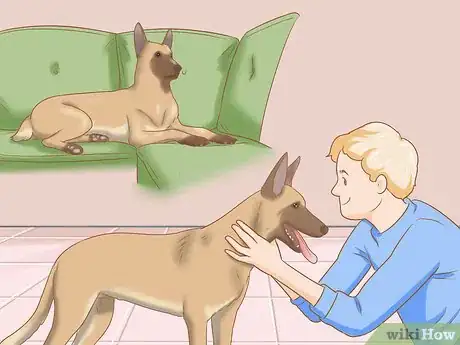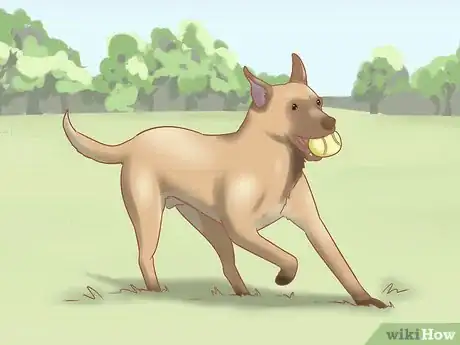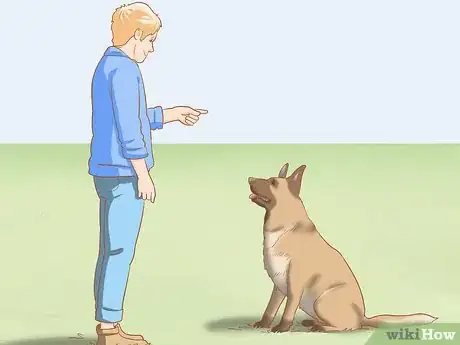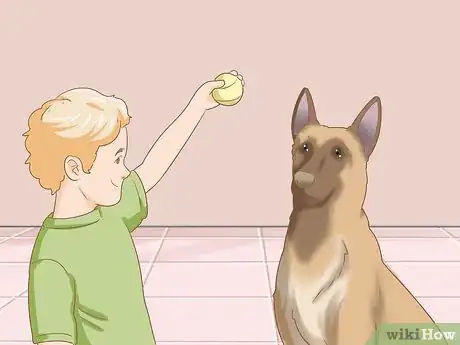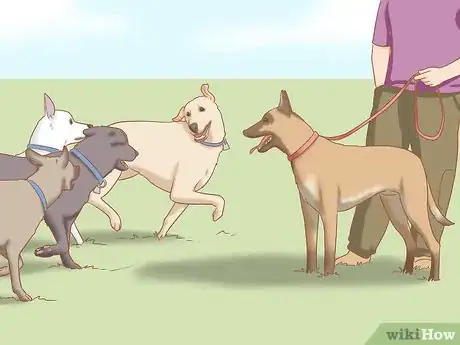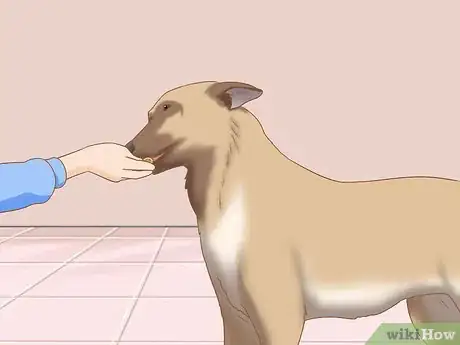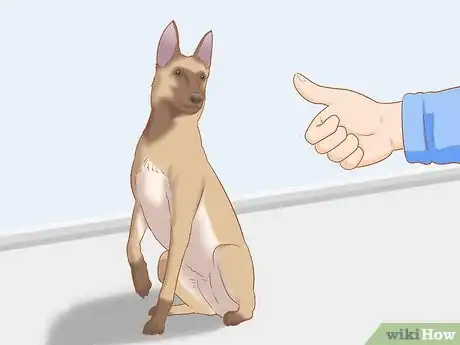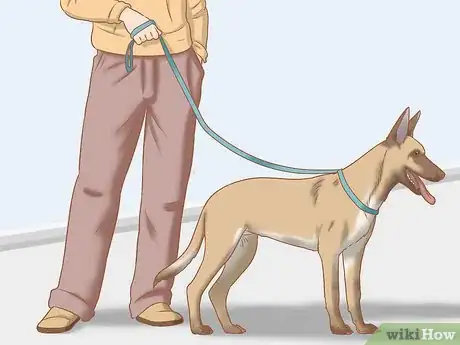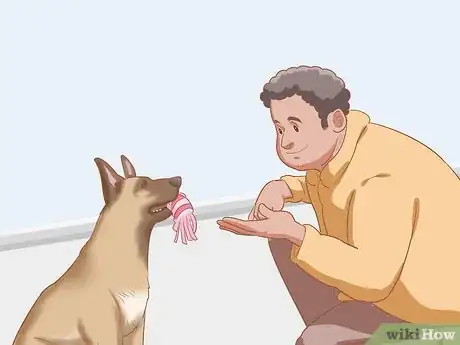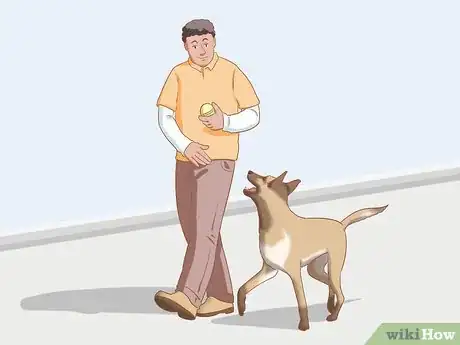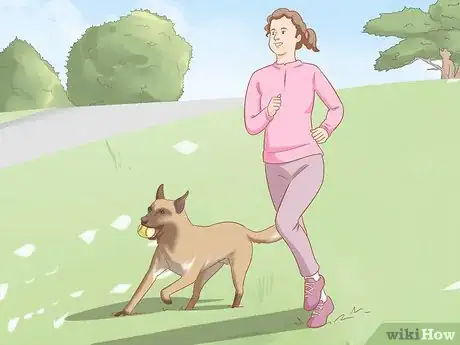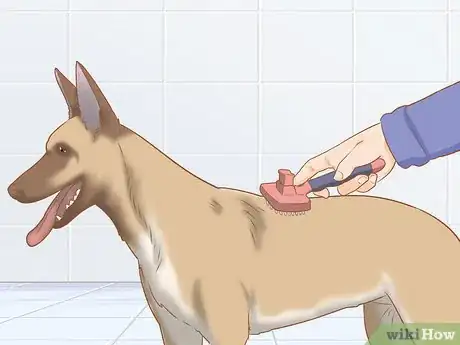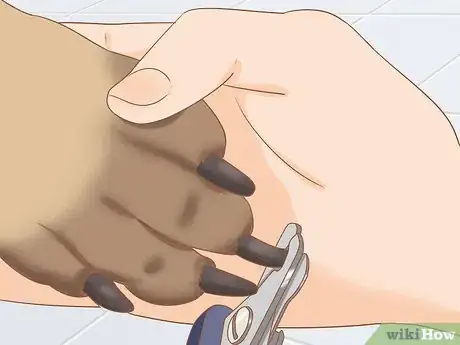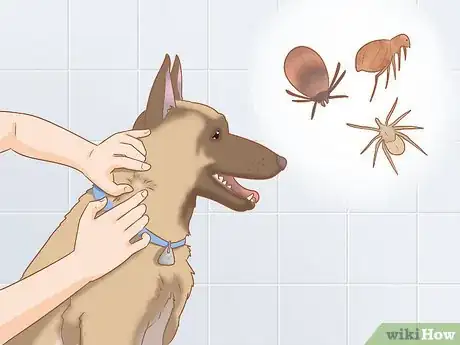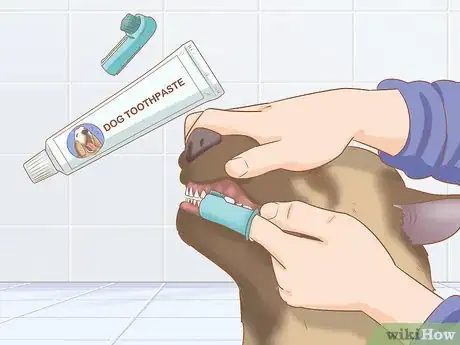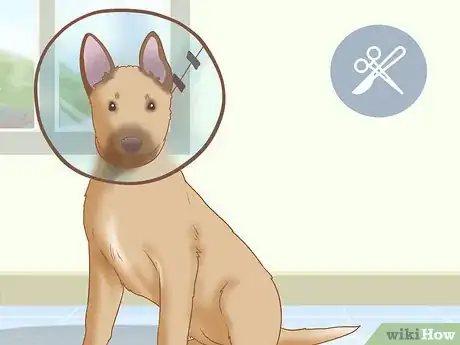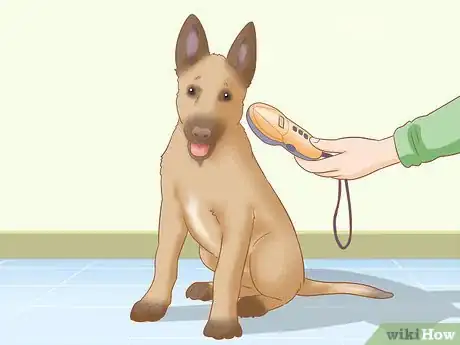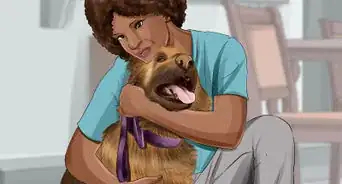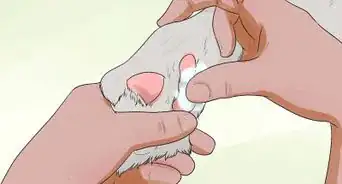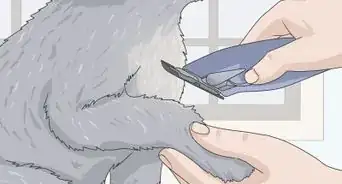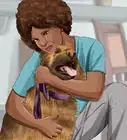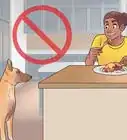This article was co-authored by Colleen Demling-Riley, CPDT-KA, CBCC-KA, CDBC. Colleen Demling-Riley (CPDT-KA, CBCC-KA, CDBC) is a Canine Behavior Consultant and the Founder of Pawtopia Dog Training. With more than 20 years of experience, she specializes in creating and customizing dog management programs for dog owners. She is a Certified Pet Dog Trainer-Knowledge Assessed, Certified Behavior Consultant Canine-Knowledge Assessed, Certified Dog Behavior Consultant, and American Kennel Club Canine Good Citizen Evaluator. Colleen is a member of the International Association of Canine Professionals and has been a featured expert in national media including the New York Times, Woman’s Day, Readers Digest, Cosmopolitan, and Yahoo.com.
There are 16 references cited in this article, which can be found at the bottom of the page.
This article has been viewed 95,906 times.
Belgian Malinois are energetic, intelligent, hardworking, and loyal dogs. They are popular in police and military work, and they also make great family pets if you are able to provide the physical exercise, attention, and training that they require.[1] Like all dogs, they have needs that are unique to their breed. They are a large breed that requires significant amounts of exercise, are easily trained, and are extremely loyal.
Steps
Providing an Ideal Home Environment
-
1Provide a loving home. Belgian Malinois usually live to be 14 to 16 years old and become beloved parts of your family. They are loving and loyal pets who want to earn your praise and love. Bond with your Malinois by taking care of them, giving them attention, and being physically affectionate. They can do well in a variety of homes either with other pets or as the only dog.
- A well socialized Malinois does well in a home with other animals. Regardless of their breed, some dogs do better than others in homes with other animals based on their individual temperament. As a whole, Belgian Malinois are happy in homes with other animals.
-
2Provide ample space for your dog to play. A Belgian Malinois should fit your lifestyle and your lifestyle should also fit the needs of a Belgian Malinois. Belgian Malinois are very active dogs and do best in environments where they have space to run and play.[2] Life in a small apartment without any yard would be hard on a Belgian Malinois.Advertisement
-
3Commit to spending several hours each week to training. Like all dogs, Belgian Malinois require time and attention to become well trained. They are also very loyal dogs and prefer to be around their owners and family. They do not enjoy being left alone for significant amounts of times without social interactions.
- Belgian Malinois are very intelligent dogs who want to please their owners. They are very easy to train, in comparison to other breeds, but they need their trainer to be firm and consistent.[3]
- You must be prepared to spend a significant amount of time, at least an hour a day, exercising your dog. This breed is a working dog and they do have a lot of energy.[4] If they do not have opportunities to expend energy, such as through play or exercise, they can become destructive and act out.
-
4Watch your dog around small children, if applicable. Belgian Malinois are great family dogs and enjoy being around children. They are extremely loyal to their owners and families and can be wary of strangers if they perceive them as a threat. This makes them great guard dogs, but they must be taught not to be overly protective of small children through proper socialization.
- They are very loving with children but due to their larger size, they can unintentionally knock children over when playing. They also have strong herding instincts and may try to herd small children if not corrected.[5]
- Small children should be watched closely around pets since kids have a tendency to pull on dog's fur, ears, and tails, which can hurt a dog.
Training and Socializing a Belgian Malinois
-
1Introduce your dog to new environments. Like all dogs, Belgian Malinois must be taught to appropriately greet and interact with other dogs and people.[6] You should make a conscious effort to expose your dog to new environments, experiences, people, and animals.[7] Belgian Malinois are a social breed and enjoy interacting with other dogs and people. Since they are very protective, they may initially be wary of strangers. By exposing them to new people in safe environments, they learn that new people are not a threat.[8]
- Introduce your dog to your neighbors, friends, and family. Use a friendly tone of voice and be excited to see the new person. This lets the Malinois know that you do not perceive these new people as a threat. Once they realize they are not a threat, let the dog approach the new person.[9] Give your friend a few treats to share with the dog so they can form positive associations with meeting new people.
-
2Let your dog engage with other dogs. Belgian Malinois do enjoy playing with other dogs and it is important to socialize your dog to interact positively with other animals. Take your Malinois to areas where other dogs are, like dog day cares or on walks with other dogs. This gives them an opportunity to play with a variety of other dogs and to be exposed to new environments.[10]
- If your friends and family have dogs, set up a play date so the two dogs can meet. Let the dogs approach each other and become acquainted. Demonstrate that you do not perceive the other dog as a threat to your safety by petting it and speaking in a kind and reassuring tone.
-
3Use positive reinforcement. Belgian Malinois want to please their owners by following their directions and commands. They are working dogs that are very task oriented and enjoy being rewarded for their hard work.
- Small treats can be very helpful in training exercises, like in teaching obedience commands. Reward your Belgian Malinois immediately after they complete the task you have instructed them so they associate your praise with the action.[11]
- Positive reinforcement, through treats or praise, can also help condition your dog to respond favorably to new situations.
-
4Teach basic obedience commands. Belgian Malinois are a very intelligent breed and will learn new tasks and tricks easily. They are bred to be working dogs so they have a strong drive to follow directions and carry out tasks.
- Basic commands like sit, stay, and come are all good first commands to begin with.
- Teach your Malinois to sit by showing them a treat. When the dog looks up at the treat, move the treat close to the dog's nose, then slowly back over the dog's head. When the dog tries to follow the treat with its eyes and nose, it will usually sit down. When this happens, give the dog the treat and say "Sit."
- Stay and come can be taught in tandem. Have the dog sit in front of you while you are standing. Take a few steps backwards as you say, “stay.” If the dog gets up to follow you, instruct them to sit again and repeat the process. When the dog has learned to stay, you can begin to use the “come” command to instruct them to follow you as you back away.
-
5Leash train your dog. Belgian Malinois tend to be very attached to their owners and families, so there is less of a risk of them running away than with other breeds. However, they do need to be taught to walk on a leash and to follow your commands.[12]
- Belgian Malinois are very strong and can pull while on a leash. If your dog begins to pull while you are walking them on a leash, you can stand still and wait until they reach the end of the leash and are forced to walk back to you. You can also use treats to encourage dogs to stay close to your side and to match your gait.[13]
- Do not use retractable leashes. They are often not strong enough to be used with larger dogs, and they reinforce bad leash habits like walking far ahead or behind you. They can also negatively impact the socialization work that you’ve already done. If you retract the leash anytime another dog or person comes close to you, you are signaling to your Malinois that you perceive that person or dog to be a threat.
-
6Train consistently. When it comes to training, practice makes perfect. You will need to spend time each day - depending on your dog’s obedience level it may be numerous 15 minute intervals - practicing the commands and tricks that you want the dog to learn.[14]
- Most Belgian Malinois will enjoy training since it gives them an opportunity to spend time with you and provides mental stimulation.[15]
- Once your dog is fully trained, you should continue to frequently practice the commands that they have learned so they retain them over time.
-
7Enroll in an obedience class. While most Belgian Malinois are easy to train, some owners feel overwhelmed with the training process if they have not trained a dog before. Visit your local pet store for information on obedience classes, or search for classes in your area online.
- There are classes for puppies and adult dogs, and most will allow you to sit in on the classes so you learn proper techniques.
- You can also enroll in an obedience class to teach your Malinois more advanced commands.
Keeping Your Belgian Malinois Healthy
-
1Exercise your Belgian Malinois every day. Belgian Malinois are very active dogs with high energy levels. They need to be exercised every single day to keep them happy and healthy. When Malinois do not have an opportunity to expend their energy, they may turn to destructive behaviors like chewing furniture and destroying their beds to alleviate their boredom.
- Daily walks are not enough exercise for a Belgian Malinois unless you are an avid runner who jogs several miles each and every day.
- Belgian Malinois do best when they have large fenced in yards to play in. Many Malinois enjoy retrieval games, participating in agility trials, running, hiking, biking, and spending time with their owners outdoors.[16]
- In addition to physical exercise, they also need mental exercise. They are very intelligent and may enjoy participating in Schutzhund, advanced obedience training, agility, herding, and tracking exercises.[17]
-
2Choose a healthy dog food. Since Belgian Malinois are very active dogs who enjoy strenuous exercise, they need to be fed healthy and nutritious dog foods.
- Feed your Belgian Malinois on a regular schedule and always have clean water available for them to drink.[18]
- Healthy dog foods should have a balance of proteins, carbohydrates, and fats. Typically, working dogs need more protein than the average house pet so look for a dog food that is around 25 to 30% protein.
- Work with your veterinarian to determine the amount of food your dog needs based on their health and activity levels.
-
3Brush their fur regularly. Belgian Malinois require some grooming but are generally clean and easy to care for animals. They do not require professional dog grooming, though you can always choose to take them to a dog groomer to be bathed or to have their nails trimmed. Brushing can help to mitigate shedding and reduce skin irritation.
- Belgian Malinois have short and weatherproof fur. Their coat will shed out twice a year as the dog’s body prepares for winter and summer weather.[19]
- They require routine brushing to keep the fur clean and to protect it from matting. During shedding season, they need to be brushed every day.
-
4Trim their nails. Belgian Malinois need extensive exercise and many owners will choose to give them that exercise by running on pavement or concrete. These surfaces can be tough on dog’s nails and cause breakage if nails are not trimmed properly.
- Their nails should be trimmed regularly to protect them from breaking and becoming over grown. Dog’s nails grow continuously like humans and need to be trimmed every month.
-
5Examine their skin for irritation. Your Malinois’ skin can become irritated from tick or flea bites or from allergies. Check their skin for any rashes, dryness, or irritation that seems to be bothering them.[20]
- You may notice that the dog is scratching or biting at a certain spot on their body, which can be an indication that there is an issue there.
- If your dog has allergies, your veterinarian may recommend using an over the counter antihistamine.
-
6Brush their teeth. Use a dog toothpaste and a toothbrush that is specifically designed for use with dogs to clean their teeth thoroughly.
- Brush their teeth two or three times during the week. This will help to protect their teeth and maintain good oral health.
- Condition the dog to enjoy brushing their teeth by selecting a dog toothpaste in a flavor that they enjoy and reward them with praise and a small treat after brushing.
-
7Meet their medical needs. As a breed, Belgian Malinois are more at risk for some medical conditions than others. By knowing what sort of conditions they are susceptible to, you can take preventative measures early on. [21]
- Like most larger dog breeds, they are at risk of hip dysplasia. Responsible breeders will genetically test for hip dysplasia before breeding puppies, but you may not know a dog’s genetic background if it is adopted. Veterinarians are able to X-ray the dog’s hips to check for the condition.
- Some Belgian Malinois are at risk of hereditary juvenile cataracts. Cataracts can develop as the dog gets older and can often be removed through surgery.
- There is some evidence to suggest that Belgian Malinois may be slightly more susceptible to epilepsy, though extensive research has not been completed. If your dog begins to show signs of epilepsy, take them to the veterinarian immediately.[22]
-
8Take them to the veterinarian. When you first purchase or adopt a Belgian Malinois, you need to take them to the veterinarian as soon as possible to ensure that they are healthy. Like all dogs, Belgian Malinois require routine medical care to keep them healthy and maintain their quality of life.
- Belgian Malinois also require routine vaccinations for diseases like rabies. They also need medical protection from fleas, ticks, and heartworm.
-
9Spay or neuter your Belgian Malinois. If you do not intend to use the dog for breeding, you should desex your pet when it is safe to do so, usually between 6 and 9 months.[23] Spaying or neutering your dog can increase their lifespan on an average of 1 to 3 years, reduces their risk for some diseases, like uterine or prostate cancer, and decreases aggressive behavior.[24]
- Spaying or neutering your pet also helps to control the companion animal population. There are millions of dogs that are waiting in shelters for homes and sterilization helps to reduce the animal population.
-
10Microchip your dog. A microchip contains your contact information and the information for your veterinarian. This is highly recommended by veterinarians and this is a simple procedure that can be completed during a regular visit. If your dog ever runs away, becomes lost, or is stolen, a microchip can help your dog be returned to you.
- It is a very small chip that is usually implanted in the scruff of the dog’s neck or over their shoulder blades where they cannot reach it.
Warnings
- Belgian Malinois that are not properly socialized may be aggressive towards other people and dogs. They are typically acting in a defensive manner to protect their beloved owners, but this is behavior that must be corrected.⧼thumbs_response⧽
References
- ↑ Colleen Demling-Riley, CPDT-KA, CBCC-KA, CDBC. Canine Behavior Consultant. Expert Interview. 25 March 2022.
- ↑ Colleen Demling-Riley, CPDT-KA, CBCC-KA, CDBC. Canine Behavior Consultant. Expert Interview. 25 March 2022.
- ↑ Colleen Demling-Riley, CPDT-KA, CBCC-KA, CDBC. Canine Behavior Consultant. Expert Interview. 25 March 2022.
- ↑ Colleen Demling-Riley, CPDT-KA, CBCC-KA, CDBC. Canine Behavior Consultant. Expert Interview. 25 March 2022.
- ↑ http://www.vetstreet.com/dogs/belgian-malinois#personality
- ↑ Colleen Demling-Riley, CPDT-KA, CBCC-KA, CDBC. Canine Behavior Consultant. Expert Interview. 25 March 2022.
- ↑ http://pets.webmd.com/dogs/guide/socializing-new-puppy?page=2
- ↑ http://www.yourpurebredpuppy.com/reviews/belgianshepherds.html
- ↑ Colleen Demling-Riley, CPDT-KA, CBCC-KA, CDBC. Canine Behavior Consultant. Expert Interview. 25 March 2022.
- ↑ Colleen Demling-Riley, CPDT-KA, CBCC-KA, CDBC. Canine Behavior Consultant. Expert Interview. 25 March 2022.
- ↑ http://www.humanesociety.org/animals/dogs/tips/dog_training_positive_reinforcement.html
- ↑ http://dogtime.com/dog-health/general/386-leash-training
- ↑ http://shibashake.com/dog/leash-training-your-dog
- ↑ http://www.nylabone.com/dog-101/training-behaviors/obedience-training/
- ↑ Colleen Demling-Riley, CPDT-KA, CBCC-KA, CDBC. Canine Behavior Consultant. Expert Interview. 25 March 2022.
- ↑ http://www.malinoisclub.com/abmc/about-malinois/is-the-malinois-right-for-you/
- ↑ http://www.yourpurebredpuppy.com/reviews/belgianshepherds.html
- ↑ http://www.akc.org/dog-breeds/belgian-malinois/care/#feeding
- ↑ http://dogtime.com/dog-breeds/belgian-malinois
- ↑ http://www.yourpurebredpuppy.com/health/belgianshepherds.html
- ↑ http://www.nbsdc.co.uk/bsd.htm
- ↑ http://www.malinoisclub.com/abmc/about-malinois/
- ↑ http://www.petmd.com/dog/care/evr_determining_best_age_to_spay_or_neuter
- ↑ http://www.spayusa.org/benefits.php
About This Article
To care for a Belgian Malinois, exercise it every day by doing something like running, biking, or playing fetch, since these are active dogs with high energy levels. Additionally, feed your Belgian Malinois healthy, nutritious dog food that contains 25-30% protein. In order to keep its fur clean and free of mats, make sure to brush your dog regularly. You should also take it to the vet once a year for routine vaccinations and protection against fleas, ticks, and heartworm. For more information from our Veterinary co-author, including how to train and socialize your Belgian Malinois, read on!

